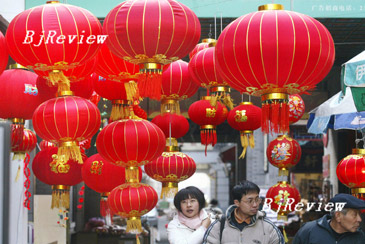
Liu Chunshun and his wife have been spending hours shopping at a Wal-Mart store in Beijing. "The Spring Festival is coming so we have to buy lots of things for our parents, parents-in-law and other relatives. It might not cost too much, but surly the shopping is tiresome," Liu, 32, a sales manager in a software developing company told Beijing Review.
Though the Spring Festival is still more than a week away the country has already begun preparing to celebrate. Traditional red Chinese lanterns have been raised above city streets across the country and banners line the roads inviting shoppers to New Year sales.
The Spring Festival, or also known as Chinese Lunar New Year, is the most important festival for the Chinese people. But in China's changing society, the event has turned into something less like a festival and more like an economic phenomenon. Economists call it a 'commercial trigger'--an event that causes a surge in spending.
Many Chinese confess that the Spring Festival has already become an economic and psychological burden for them. They are tired of the excessive number of advertisements for sales and promotions and the problem of deciding what to buy for whom. Drinking and eating during the festivities is another burden on consumers' pockets. And for health conscious Chinese who have spent the year keeping in shape the Spring Festival can seem like a burden on their belly too.
According to Guo Zhichun, a culture commentator at the Global Times: "No country's New Year is parallel to the Spring Festival in China in terms of commercialization and materialism."
In Western countries friends and relatives exchange gifts on Christmas Day but their gifts are usually simple: a card, a book or some candies are enough. In China, gifts have become increasingly expensive, noted Guo.
"Even the greeting words are something too material," said Guo. "The most popular greeting words Chinese people use during Spring Festival are 'congratulations for getting rich' or 'may you be prosperous', and 'wish-you- good-health' then comes after that."
Spring Festival is not alone. The other important traditional Chinese festivals such as the Lantern Festival, Dragon Boat Festival and Mid-Autumn Festival seem to be losing their essence and turning into simple shopping events too.
Protection needed or not
Perhaps even more alarming than the commercialization of China's festivals is that people are becoming increasingly less familiar with their own traditions. According to a survey conducted by the Beijing Youth Daily, during the Spring Festival 49.9 percent of respondents said they fire firecrackers, while only 17.7 percent said they have a ceremony to worship their ancestors and a mere 16 percent said they put up Spring Festival couplets on the front gates of their houses (which are composed of two sentences which match each other in sound and sense to express cherished wishes). Many experts as well as ordinary people have begun to worry that China's traditional festivals and customs may wither away.
| 